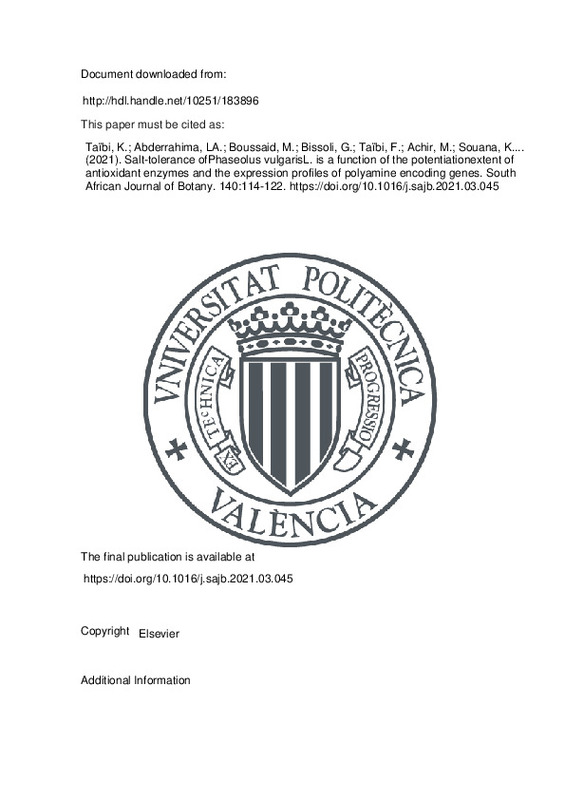JavaScript is disabled for your browser. Some features of this site may not work without it.
Buscar en RiuNet
Listar
Mi cuenta
Estadísticas
Ayuda RiuNet
Admin. UPV
Salt-tolerance ofPhaseolus vulgarisL. is a function of the potentiationextent of antioxidant enzymes and the expression profiles of polyamine encoding genes
Mostrar el registro sencillo del ítem
Ficheros en el ítem
| dc.contributor.author | Taïbi, Khaled
|
es_ES |
| dc.contributor.author | Abderrahima, Leila Ait
|
es_ES |
| dc.contributor.author | Boussaid, Mohamed
|
es_ES |
| dc.contributor.author | Bissoli, Gaetano
|
es_ES |
| dc.contributor.author | Taïbi, Fadhila
|
es_ES |
| dc.contributor.author | Achir, Mohamed
|
es_ES |
| dc.contributor.author | Souana, Kada
|
es_ES |
| dc.contributor.author | Mulet, José Miguel
|
es_ES |
| dc.date.accessioned | 2022-07-06T18:03:15Z | |
| dc.date.available | 2022-07-06T18:03:15Z | |
| dc.date.issued | 2021-08 | es_ES |
| dc.identifier.issn | 0254-6299 | es_ES |
| dc.identifier.uri | http://hdl.handle.net/10251/183896 | |
| dc.description.abstract | [EN] Selection and improvement of crop salt tolerance constitutes an urgent need for increasing agricultural and food production to feed the growing human population. Two bean (Phaseolus vulgaris L.) genotypes, namely Tema and Djadida varying in their tolerance to NaCl, were selected to investigate the determinant physiolog-ical and molecular mechanisms underlying salt tolerance. At the physiological level, salinity resulted in a sig-nificant decrease in growth, water status, stomatal conductance and photosynthesis for both genotypes. The potassium content was higher in the salt-tolerant genotype Tema under normal and saline conditions. Both genotypes had a significant increase in proline, glucose, fructose and sucrose concentrations, but glucose and fructose were differentially higher in the salt-tolerant genotype. While putrescine and spermidine concentra-tions decreased, spermine concentration significantly enhanced under salt stress along with antioxidant enzymes activities namely catalase, glutathione reductase and ascorbate peroxidase. The increase was higher in the salt-tolerant genotype. The expression levels of genes encoding enzymes involved in spermine biosyn-thesis revealed an upregulation of spermine synthase (SPMS) and a downregulation of polyamine oxidase (PAO4). Overall, the difference between genotypes is more quantitative than qualitative; the salt-tolerant genotype Tema displayed a better physiological and molecular response under salinity. By measuring these molecules in salt-stressed plants, several genotypes could be screened for breeding programmes leading to improve salt tolerance in beans. (c) 2021 SAAB. Published by Elsevier B.V. All rights reserved. | es_ES |
| dc.language | Inglés | es_ES |
| dc.publisher | Elsevier | es_ES |
| dc.relation.ispartof | South African Journal of Botany | es_ES |
| dc.rights | Reconocimiento - No comercial - Sin obra derivada (by-nc-nd) | es_ES |
| dc.subject | Salt tolerance | es_ES |
| dc.subject | Phaseolus vulgaris | es_ES |
| dc.subject | Physiological response | es_ES |
| dc.subject | Antioxidants enzymes | es_ES |
| dc.subject | Polyamines | es_ES |
| dc.subject | Genes expression | es_ES |
| dc.subject.classification | BIOQUIMICA Y BIOLOGIA MOLECULAR | es_ES |
| dc.title | Salt-tolerance ofPhaseolus vulgarisL. is a function of the potentiationextent of antioxidant enzymes and the expression profiles of polyamine encoding genes | es_ES |
| dc.type | Artículo | es_ES |
| dc.identifier.doi | 10.1016/j.sajb.2021.03.045 | es_ES |
| dc.rights.accessRights | Abierto | es_ES |
| dc.contributor.affiliation | Universitat Politècnica de València. Departamento de Biotecnología - Departament de Biotecnologia | es_ES |
| dc.contributor.affiliation | Universitat Politècnica de València. Instituto Universitario Mixto de Biología Molecular y Celular de Plantas - Institut Universitari Mixt de Biologia Molecular i Cel·lular de Plantes | es_ES |
| dc.description.bibliographicCitation | Taïbi, K.; Abderrahima, LA.; Boussaid, M.; Bissoli, G.; Taïbi, F.; Achir, M.; Souana, K.... (2021). Salt-tolerance ofPhaseolus vulgarisL. is a function of the potentiationextent of antioxidant enzymes and the expression profiles of polyamine encoding genes. South African Journal of Botany. 140:114-122. https://doi.org/10.1016/j.sajb.2021.03.045 | es_ES |
| dc.description.accrualMethod | S | es_ES |
| dc.relation.publisherversion | https://doi.org/10.1016/j.sajb.2021.03.045 | es_ES |
| dc.description.upvformatpinicio | 114 | es_ES |
| dc.description.upvformatpfin | 122 | es_ES |
| dc.type.version | info:eu-repo/semantics/publishedVersion | es_ES |
| dc.description.volume | 140 | es_ES |
| dc.relation.pasarela | S\436136 | es_ES |
| dc.subject.ods | 01.- Erradicar la pobreza en todas sus formas en todo el mundo | es_ES |
| dc.subject.ods | 02.- Poner fin al hambre, conseguir la seguridad alimentaria y una mejor nutrición, y promover la agricultura sostenible | es_ES |
| dc.subject.ods | 03.- Garantizar una vida saludable y promover el bienestar para todos y todas en todas las edades | es_ES |
| dc.subject.ods | 06.- Garantizar la disponibilidad y la gestión sostenible del agua y el saneamiento para todos | es_ES |
| dc.subject.ods | 08.- Fomentar el crecimiento económico sostenido, inclusivo y sostenible, el empleo pleno y productivo, y el trabajo decente para todos | es_ES |
| dc.subject.ods | 10.- Reducir las desigualdades entre países y dentro de ellos | es_ES |
| dc.subject.ods | 12.- Garantizar las pautas de consumo y de producción sostenibles | es_ES |
| dc.subject.ods | 13.- Tomar medidas urgentes para combatir el cambio climático y sus efectos | es_ES |
| dc.subject.ods | 15.- Proteger, restaurar y promover la utilización sostenible de los ecosistemas terrestres, gestionar de manera sostenible los bosques, combatir la desertificación y detener y revertir la degradación de la tierra, y frenar la pérdida de diversidad biológica | es_ES |







![[Cerrado]](/themes/UPV/images/candado.png)

